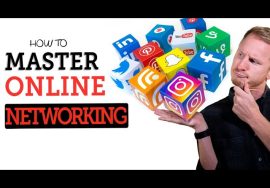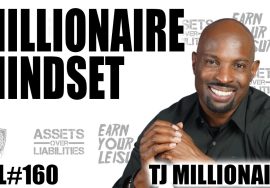How to Find a Mentor Who Can Accelerate Your Career | Christine vs. Work
Now’s the time to get FOMO about having a mentor.
Subscribe to the Ascend newsletter:
Learn more about our sponsor, Confluence, at and
Research shows mentorship has a positive impact, but despite the facts many people still don’t actively have one. No matter what stage you are in your career, a mentor has a positive impact on your engagement at work, chances of promotion, and sense of purpose. If you’re not sure where to start, here are steps on how to find a mentor to best help you and your career.
00:00 What's with all the hype about mentors?
01:39 So what if I don't have a mentor?
02:14 Know your goal before you seek a mentor
02:58 Mentorship is a two-way relationship
03:27 What makes a good mentor?
03:50 Time to write a pitch
04:26 You have to take the lead!
04:53 I think I found THE ONE
In this episode, Innovation Editor Christine Liu talks to Leslie Camino, Senior Director, Executive & Next Generation Leadership Development, Culture, Diversity, Equity And Inclusion at Keysight Technologies. Mentors—which can also be framed as a personal board of directors or thought partners—are a rich source of insight and networking opportunities. She lays out exactly what to do before, during, and after you send out an invitation to connect.
Learn more about Leslie Camino:
Watch more about Confluence on their YouTube Channel:
About:
Produced by Andy Robinson, Christine Liu, and Kelsey Alpaio
Video by Andy Robinson and Christine Liu
Editing by Andy Robinson
Animation and Design by Riko Cribbs and Karen Player
Follow us:
#mentorship #careerhelp #leadershp











@Christine, this was a great video on an important topic. Thank you so much. I would recommend a follow-up video by exploring how to maintain relationships with mentors and additionally, elaborating more on “what value you offer to the mentor”.
Totally agree with this. I joined a mentor platform recently (kind of like a tinder for mentors and mentees) and it was great at the start but sustaining that connection with someone who I’ve only spoken to a couple of times was definitely something I struggled with. Would love to hear more on that!
Imposter Syndrome can creep into our lives in so many areas of our lives…including finding a mentor! I loved the little nod to this. Thank you for sharing these great insights!
Thank you for this content. Truly inspiring!
@Christine – Thanks for cool and relevant videos. Always a joy to watch them. Can you please make videos on the following topics: (1) how support groups at work can develop business acumen? (2) how to give feedback to leaders way above your rank? (3) how to become more marketable as an employee? Thanks so much!
Thank you for posting this video. This is the third time I’ve seen the word mentor in the video title so I will look more into it, as I am committed to building my next career right now.
Hi there! Thank you so much for this content! I saw so much of myself in this video, with all the doubts and insecurities. With your step-by-step, I hope I find a mentor soon!
The way you told the content is super cool and easy to grasp. Thanks for sharing, Christine!
Hey Christine, thank you so much for this video.
Can you make video on how to build a meaningful relationship with people who you do not know on Linkedin.
I’m kind of an introvert, so conversations with people are what I struggle with.
Thanks @Christine. I totally enjoy your series.
Can you pls talk something about conflict at work and how you can get better at it, as in, handling conflict well.
Not sure if you have done a video already, but I would love to watch it your style
@Harvard Business Review Thank You !
Hi Sai, thanks for the kind feedback! I recommend this HBR video featuring my colleague Amy Gallo, who literally wrote the book on conflict at work. Take a look! https://www.youtube.com/watch?v=cRmKCXbHTRE —Christine
Hello, Christine! This video is very insightful and straightforward. Could you please do a video on how to deal with toxic colleagues? Thank you. Peace ✌? from Mauritius ??
Hi, Christine. Is super relaxing and inspiring to watch your video at quiet night. At workplace, I always encountered the problem on hidding my true emotional feeling and always said yes to my superiors. Despite heavier workload and feeling almost burst out, I always force myself to accept the unacceptable in order to test my stress test level. Over the 2 years in my role and fulfill all my superiors’ needs, now come into a diminishing point that I feel myself become likes a lone ranger and feeling demotivating as my superior and collegeous always have perception that, I can do it. When things can’t be completed on time due to mountain workloads, I sacrifice my family time, study time, all times to fulfilled their need. The reason why I hidding my true feeling to my superior is that, I hope my superior see through me, recognised my works and the sense of being appreciated irregardless of my age. Sadly, my superior have this perception that “old is gold”. Despite that I can perform reasonably well, sadly, my leads will thinks that my age is too young to get promoted. Hopefully Christine can come out a video on how to manage emotional feeling when you are doing the right things but getting no recognition and discredit. How to voice out and manage the situation when superior is autocratic type. Thanks
Hi Kah, thanks for sharing. I can’t imagine how painful it is to feel like a lone ranger and unappreciated. No one deserves that. For now, these HBR articles may help: https://hbr.org/2017/12/what-to-do-when-you-dont-feel-valued-at-work https://hbr.org/2020/11/gg-ascend-pub-11-11-how-old-is-old-enough Are there other peers at your company you’re comfortable talking to? Also, if you are able to, seeking a mentor may also help you figure out your next steps. I hope things improve ❤️Please check in later and let us know how it goes. —Christine
Thanks Christine for this post. It is surely going to be useful.
Can you please post an article on how to work on improving perception of line manager based on one earlier negative incident or feedback.
Thanks
CHRISTINE! I love your videos so much ❤️
Great advice! Thanks for sharing.
Hello! Thank you for the video. I would like you to explore for the next video or if you could share with me some content to deal with the following situation: a couple of months ago I was promoted and within the new work team I have colleagues who have much more experience than me and also seem to have a very dominant character, which is causing me a lot of insecurity to the point of not knowing if I am lagging behind in the eyes of my boss. I would appreciate it if you can recommend me something about it
Hi Christine I cant believe Im gonna say this. I have been watching all your videos in the past and I’ve never been a fan but this is the best video so far. Super impressed and really great job
Hi random – I appreciate your sticking with me! I’m glad I won you over ? —Christine
It was pretty good. Thank you 🙂
Would love to hear you talk about promotions or salary transparency
@Harvard Business Review Bahh can’t wait ?❤?
Hi Danielle, no spoilers—but you’re not going to be disappointed with the rest of the season ?—Christine
@Christine ! I didn’t understand the part where you said mentorship is a two-way relationship. Why would somebody mentor us for free ? Is it more like pro-bono consulting?
Hi Rahul, thanks for asking! Happy to clarify. This part really helped me—figuring out what I could (potentially) offer in exchange for someone’s mentorship. This made it felt more like a value exchange versus just asking them for help. Think about what unique skills or experience you could share (technical skills? trendspotting? personal network?). Also, if you’re closer to the action on the ground, that can be insightful for a senior person who is inherently more distanced. Even if this exchange never practically comes up, I felt like it helped me get over the psychological hump of thinking, “Why would THEY take time out of their day for ME?” and feel more confident about the ask. Let me know if this helps! —Christine
It would be great to have more mentors. Very few people want to do that, though. No one wants to teach; often, if they do mentor someone, it is someone who resembles them. It’s especially hard in academia to break into anything new as others are gatekeepers to a space where there isn’t much diversity to begin with.